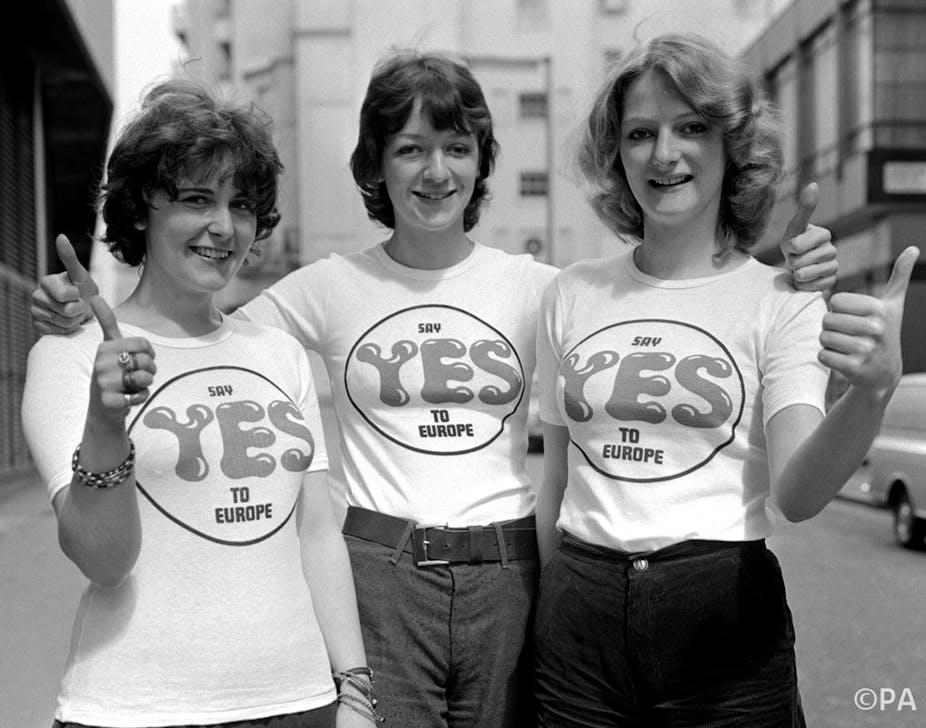Just before the referendum on Britain’s membership of the European Economic Community in 1975, Foreign Secretary James Callaghan worked hard to renegotiate the terms of British membership.
The concessions agreed back then are now widely seen as having had little lasting value – they related to imports of New Zealand dairy products and a complex correcting mechanism within the EEC budget. And yet, at the time they were popular. At the subsequent referendum, the UK voted two-to-one in favour of staying in the EEC.
While the context of the 1975 referendum was very different, the way the renegotiation terms were presented back then offers some valuable lessons for the people campaigning to keep Britain in the EU today.
However, the conduct of the campaign so far suggests that Prime Minister David Cameron may struggle to replicate Harold Wilson’s successful 1975 campaign to remain in the EEC in the face of opposition from his own government ministers.
Lukewarm on Europe
Opinion polls in early 1975 suggested that the electorate was lukewarm in its support for Europe. But the idea of renegotiating was popular, especially among Labour voters. It demonstrated that the EEC was willing to listen to Britain’s concerns and that Britain could lever authority within the European Community.
The renegotiation subsequently featured prominently in the manifesto of the Yes campaign. It was even mentioned at the top of the referendum ballot paper. Voters were instructed that “The government have announced the results of the renegotiation of the UK’s terms of the EC”. They were then asked: “do you think that the United Kingdom should stay in the European Community (the Common Market)”.
By contrast, polling suggests that Cameron’s renegotiation has had little discernible impact on public attitudes to the EU. He spent weeks convincing fellow European leaders to allow the UK to limit welfare payments to EU migrants, among other measures, but voters appear unmoved.
Crucially, Harold Wilson was cautious in the way he presented the value of the new terms gained through renegotiation, in contrast to the more strident tone used by Cameron. Following the Labour cabinet’s majority agreement to support continued membership, Wilson stated in parliament:
I believe that our renegotiation objectives have been substantially though not completely achieved.
The Yes manifesto subsequently focused on the fact that many of Britain’s key historical trade partners in the Commonwealth supported its continued membership of the EEC, rather than promising significant change.
Wilson’s cautious approach arguably reflected the public mood of 1975. Support for European membership was tepid at best but it was often seen as better than the alternatives. Europe was often seen as a side issue to Britain’s domestic economic problems. Indeed, Europe did not often appear as a cover story in the national newspapers, even in the weeks leading up to the referendum vote.
Setting the tone
In 2016, the Remain camp has been widely criticised for the negative tone of its campaign. It has even been labelled Project Fear by supporters of Brexit. Yet there are parallels here with the approach of the successful Yes campaign in 1975, which also highlighted how Brexit would leave Britain in an uncertain geopolitical position.

Behind the scenes, civil servants involved in contingency planning for a potential Brexit often expressed anxiety about the logistics of leaving the European Community, for which there was no real precedent.
1975 indicates that focusing on the uncertainties of leaving the EU could be an effective strategy, not least as then, like now, supporters of Brexit are far from united in what alternative economic model they would follow.
And the Yes camps should acknowledge that the debate about the value of the concessions recently achieved by David Cameron is not likely to go away anytime soon. Michael Gove has already tried to question whether the package of reforms is legally binding, and Brexit backers are likely to continue to pick holes in the deal right up until the vote.
Wilson’s success in keeping Britain in Europe in 1975 suggests that it is essential for the Yes manifesto to acknowledge the limitations of the renegotiated terms as well as their value. In particular, as has been noted, it is important that each side provides independently prepared forecasts about how the different outcomes of the vote might affect immigration over the next ten years.

